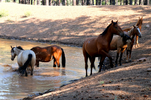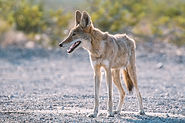Coues White-tailed Deer
Odocoileus virginianus couesi

Look for movement in understory at dawn/dusk.
The Coues white-tailed deer is a small subspecies of white-tailed deer found in the mountains of Arizona and parts of the Southwest. Adults are typically grayish-brown in color with a distinct white underside to their broad tails, which locals often call a “fantail.” Well adapted to rugged terrain, these deer inhabit oak woodlands, pine forests, and desert mountain slopes, where they browse on shrubs, acorns, grasses, and seasonal plants. Coues deer are most active in the early morning and late evening, often seen moving quietly along ridges or pausing in shaded clearings. Bucks grow small but sharp antlers, and during the fall rut may be observed sparring or trailing does. Though smaller than mule deer, Coues deer are alert, elusive, and highly valued by wildlife enthusiasts for their beauty and adaptability. Their presence adds vitality to Arizona’s mountain landscapes and offers rewarding sightings for patient observers.
Mammal

Identification & Behavior
Key Features: Gray-brown coat, large ears, white tail underside
Size: 60–100 lbs
Behavior: Shy and elusive, often freeze when spotted.
Diet: Herbivore — grasses, forbs, shrubs
Activity Pattern: Crepuscular
Habitat & Distribution
Found in southeastern Arizona, including the Sky Island mountains such as the Santa Rita, Huachuca, Chiricahua, and Patagonia Mountains. Prefers oak woodlands, pine-oak forests, and riparian corridors. Present in Coronado, Tonto, and Apache-Sitgreaves National Forests.
Elevation Range: 3,500–8,000 ft
Seasonal Presence: Year-round
Risks & Management
Use caution during rut, bucks can be unpredictable.









































